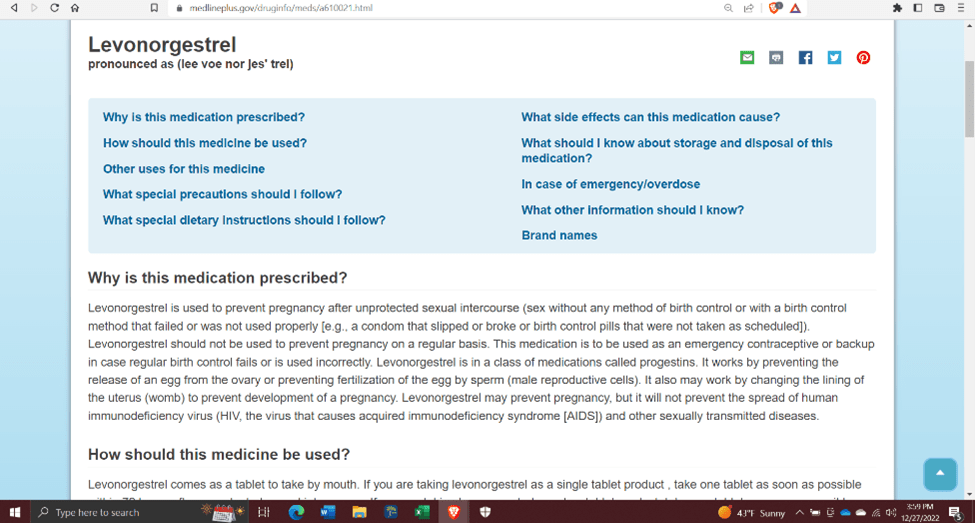
The U.S. Food and Drug Administration (FDA) is altering patient safety information regarding a popular oral contraceptive in response to pro-life objections that it can end pregnancy.
Only days ago, the “morning after” pill, Plan B One-Step, was known to damage a woman’s uterine lining, preventing a developing baby from implanting in the womb. In other words, the drug could cause an abortion.
However, FDA now says Plan B One-Step does not have abortifacient potential after all. That’s because the U.S. Supreme Court decided to end federal protections for abortion in June, and Plan B’s former product labeling has proven confusing to customers, says FDA.
Updates to the labeling are intended to “reduce barriers to use of the legally marketed approved product,” reads an agency statement. It’s convenient timing: SCOTUS hands down a ruling that affects sales of a pharmaceutical drug, so FDA swoops in to save the day.
Plan B
Plan B One-Step is a pill that women can take within 72 hours of intercourse to prevent pregnancy. It releases a synthetic hormone, levonorgestrel, which discourages ovulation — the release of an egg from an ovary. According to product literature, that is one way in which it acts to inhibit a woman from becoming pregnant.
Additionally, per Mosby’s annual Nursing Drug Reference manual, the medication also alters a woman’s uterine lining to prevent a pregnancy from developing. The uterine damage affects pregnancy post-fertilization (i.e., after conception, when a new life already exists). This abortifacient potential is characteristic of all progestins — of which levonorgestrel is one example — and has been recognized since the drug came into widespread medical use in the early 1970s.
Not anymore, according to FDA. In an updated information page on its website, the agency denies that levonorgestrel can end pregnancy. “Plan B One-Step will not work if a person is already pregnant, meaning it will not affect an existing pregnancy,” the webpage reads.
The site goes on to insist that “Plan B One-Step prevents pregnancy by acting on ovulation, which occurs well before implantation. Evidence does not support that the drug affects implantation or maintenance of a pregnancy after implantation, therefore it does not terminate a pregnancy.”
However, someone at FDA forgot to send a memo to the National Library of Medicine, (screen shot below taken 12/27/2022), which still relates information that levonorgestrel can work in three ways: “by preventing the release of an egg from the ovary or preventing fertilization of the egg by sperm (male reproductive cells). It also may work by changing the lining of the uterus (womb) to prevent development of a pregnancy.”

Not Again!
This is not the first argument about the abortifacient potential of Plan B One-Step. Levonorgestrel was one of the contraceptives at the center of the controversy over ObamaCare, which in 2012 forced all insurance companies to provide contraceptives free of charge. Hence, pro-life employers and individuals were forced pay into health plans that offer abortifacient drugs. At the time, every Catholic bishop in the United States denounced the mandate and called for it to be rescinded, and many lawsuits contested it.
For example, a case brought by two Christian retail chains, Hobby Lobby and Mardel, against the U.S. Department of Health and Human Services (HHS) included an amicus curiae brief by several physician organizations, including the American Association of Pro-Life Obstetricians & Gynecologists, the Christian Medical Association, and Physicians for Life. Experts from these groups explained that not only did FDA admit that “Plan B may prevent a fertilized egg from attaching to the womb (implantation),” but the drug manufacturer, Duramed Pharmaceuticals, also acknowledged that its product worked by “altering the endometrium, which may inhibit implantation.”
The Latest Research
Subsequent independent studies expose further details that fly in the face of current FDA claims. In 2016, researchers from Florida State University; the Catholic University of Valencia, Spain; the Universities of Padua and Padova in Italy; and the Institute for Medical Anthropology and Bioethics in Austria published their findings in the journal The Linacre Quarterly.
To their knowledge, their research was the first of its kind, seeking to compare pre- and post-fertilization effects of Plan B One-Step. Plan B’s ability to prevent fertilization would classify it as a contraceptive; its action ending pregnancy after conception would define it as an abortifacient. Their “Lay Summary” concluded that
[Plan B] was originally thought to work by preventing fertilization. Recent research has cast doubt on this. Our review of the research suggests that it could act in a pre-fertilization capacity, and we estimate that it could prevent ovulation in only 15 percent or less of cases. The drug has no ability to alter sperm function and limited ability to suppress ovulation. Further, data suggest that when administered pre-ovulation, it may have a post-fertilization MOA [mechanism of action].
The scientists discovered that the drug “insignificantly delayed ovulation,” but they noted “significant effects” in key parameters “needed for implantation” of fertilized embryos (i.e., developing babies). In other words, they concluded that levonorgestrel is an ineffective contraceptive, but is quite good at snuffing out a newly conceived life.
Moreover, researchers reported an alarming increase in the likelihood of ectopic pregnancy (implantation outside the uterus) in patients who used Plan B One-Step — more than double the occurrence observed in control groups. No developing fetus can survive ectopic pregnancy, and the condition is life-threatening to the mother if she does not seek immediate care.
Subjective Truth
The Linacre researchers also complained that the abortifacient potential of levonorgestrel is frequently ignored in studies, and they cited several examples. Curiously, each example is creditably referenced in the FDA’s December 23 Decisional Memorandum announcing updates to Plan B’s patient safety information.
In that document, FDA explains that Plan B One-Step’s manufacturer requested the updates. “Current labeling … may be misleading to consumers,” the report reads, “because it contains information on a possible contribution of postovulatory effects … and some consumers are hesitant to use a product that might affect postovulatory events.”
Not a problem! Just remove the inconvenient wording.
FDA excuses itself by arguing that the “science has evolved since the original approval,” so an update to the product’s accompanying literature is warranted. Interestingly, of the 64 references listed in the Decisional Memorandum, only one was published within the last five years, in 2017. Fifty-five of them are more than a decade old, and 23 predate 2003. So much for late-breaking research influencing patient safety updates.
Missing from the memorandum’s citations is a March 2015 study on levonorgestrel published in the journal Experimental and Therapeutic Medicine that identifies levonorgestrel as an FDA-classed “Category X” medication. It notes that “Category X drugs can be traded illegally via the internet for the purpose of early pregnancy termination.”
“Category X” is the highest-risk of FDA’s pregnancy categories. The agency defines Category X drugs as those proven to cause fetal abnormalities or pose high risks of adverse reaction — risks that “clearly outweigh potential benefits.”
As stated in The Linacre Quarterly, “This information should be made available to users of [levonorgestrel] so that they can make their choice based on informed consent.” Yet thanks to the FDA’s recent updates, patients are extremely unlikely to learn the truth.




